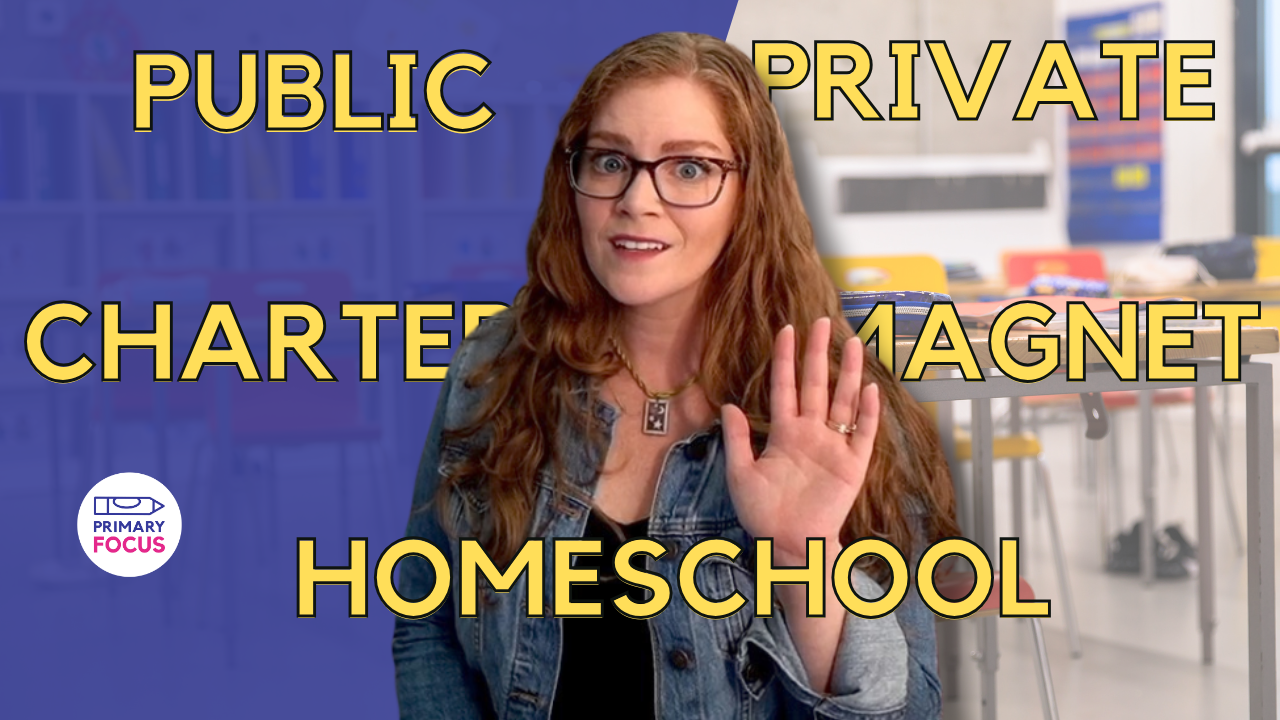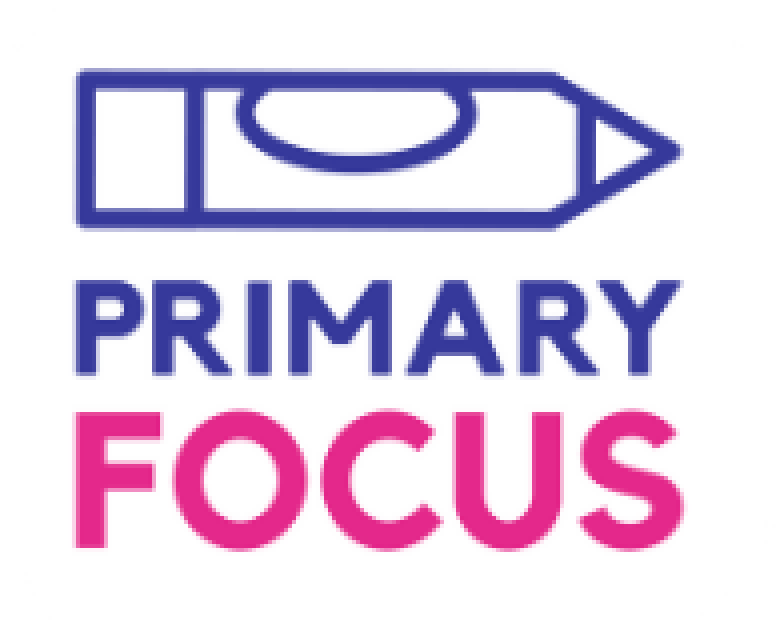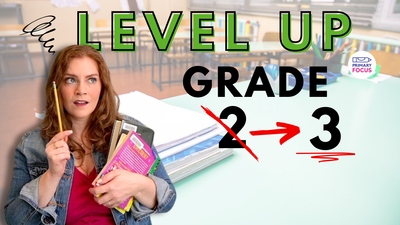
Understanding the Different Types of Schools in the U.S.
Watch the video ☝️ or read the article 👇
If you’re trying to decide where to send your child to school, it can feel overwhelming—especially if you’re doing this for the first time. You might be asking:
- What’s the difference between public, charter, and magnet schools?
- Is private school worth the cost?
- Can I really homeschool if I’m not a teacher?
This guide is here to help.
As a former kindergarten teacher, I’ve worked with families in all kinds of schools, and I’m breaking down the five main types of elementary schools in the U.S. so you can make a confident choice for your child.
1. Public Schools
Public schools are free and funded by local, state, and federal taxes. Most families are automatically zoned for a public school based on their home address.
What to know:
- Your child is guaranteed a seat in your neighborhood public school.
- These schools are governed by local school boards and must follow state curriculum guidelines.
- Public schools have to offer programing for Special Education, English Language Learners, and Gifted programs. Private schools do not.
💡 Pro tip: Even if you’re considering other options, it’s worth learning about your assigned public school. Some are wonderful matches for families!
2. Magnet Schools
Magnet schools are public schools with a specific theme or focus—like STEM, the arts, or world languages.
What to know:
- They often have an application or lottery process. It is open to all children in the school district rather than limiting to a single neighborhood.
- Magnet schools are free, but may have small additional fees to support programming. For example a music program will require your child to have an instrument and maintain it.
- Magnet programs can offer unique experiences and often attract a diverse student body.
🎭 If your child has a strong interest or you’re looking for an innovative learning model, a magnet school might be a great fit.
3. Charter Schools
Charter schools are independently run public schools that operate under a charter (or contract) with the state or local district.
What to know:
- Charter schools are free to attend but have more flexibility in their curriculum and structure.
- Some use different teaching methods or educational philosophies, while others may feel like a normal public school.
- Like magnet schools, many use a lottery system when there are more applicants than spots.
📋 Make sure to check the specific policies of any charter school you’re considering—they vary widely!
4. Private Schools
Private schools are independently funded and charge tuition. They can be religious or secular, and each one is unique.
What to know:
- Private schools set their own curriculum, teaching style, and admissions requirements.
- They do not have to offer Special Education, English Language Learner programs, or Gifted Programs
- Some offer scholarships or financial aid, but they need a certain amount of students to pay the full tuition.
- They may offer smaller class sizes or specialized programs.
💰 Private school is a big investment, but it can be the right choice depending on your child’s needs and your family’s values.
5. Homeschooling
Homeschooling means you take on the role of your child’s primary teacher. This option offers the most flexibility, but also the most responsibility.
What to know:
- Laws vary by state, so make sure to research your local requirements.
- Many families join co-ops or learning pods to get support and community.
- Homeschooling can look different for every family—it doesn’t have to be a traditional classroom at your kitchen table.
- Homeschooling is an investment of money and time. It takes a lot of work to set up and maintain homeschooling.
🏡 If you want full control over your child’s education and are willing to do some planning, homeschooling might be a good fit.
Still Not Sure Which Is Right for You?
Choosing a school is a personal decision. It’s not about finding the “best” type of school—it’s about finding the best fit for your child and your family.
So let’s say you’ve watched the video (or read this post!) and you’re ready to go a step deeper. Here’s how I can help:
🎁 Free Resource: Choose the RIGHT School Email Sequence
Download my 7 day guide that compares school types side-by-side and walks you through key questions to consider. Explore popular programs like Montessori, IB Schools, STEM / STEAM, and more
💻 Workshops (Virtual + In-Person in Charlotte)
If you're in the research phase and want expert guidance and Q&A, join me for one of my upcoming Choosing the Right School workshops!
👉 See upcoming dates and register
🎓 On-Demand Course: Your Child’s Ideal School
Want to go deeper at your own pace? My self-guided course helps you reflect on your child’s learning needs, explore school options in your area, and make a confident decision.
Choosing a school is a big decision—but you don’t have to do it alone. I’m here to help you navigate it with clarity and confidence. ❤️
Video Transcript
Hey, it's Natalie and welcome back to Primary Focus, the Parents Guide to Elementary School. I'm so glad that you're watching today. Picking out a school for your child can become so confusing. there are just a lot of terms that get thrown around when you're searching for a school. I wanted to use this video today to start at the top and talk about the five main types of schools that you'll see in the United States from here.
You can start to go down the rabbit holes in different directions and search for the right school for your child, but you can't start that search if you don't understand these five main terms.
When you're on that search, you're going to hear repeatedly about five types of schools, public school, magnet school, charter school, private school, and homeschool.
We're gonna talk this through from the elementary school lens, so kindergarten through fifth grade. But a lot of what I will say will ring true all the way through the high school level.
Let's start from our home base, which would be number one, public school. When we're talking about a public school in the United States, this is going to be your default. No matter where you move, your child will be assigned a public elementary school, middle school, and high school that they will go to so long as they live at that address.
Public school can sometimes feel like the underdog here. It's the default, it's free, but I promise you, there is a great public school just down the street with a teacher that is excited to meet your child.
Just because public schools don't have marketing departments doesn't mean that they are the bad choice. Make sure in your search that you are giving the public school a fair shot. I'm a product of public schools and private schools, and I had great experiences at. Both. I have taught at both public and private schools.
Honestly. There's pros and cons to each, every school has its own flavor based on the need of the community and what people come together to create.
when we're talking about public school, we are talking about a school that is completely free of charge and any child can enroll so long as they meet the age requirements and live in the zone that the school is made for. These schools will follow state education guidelines and have some oversight from the Department of Education.
But in the end it is the state and school district that is deciding what is going down on the day-to-day level in terms of curriculum. That said, they. All have standards set by your state, so most public schools, you'll get the same kind of flavor no matter where you're sending your child.
This is really important because if you do move from one county to another, you can ensure that your child is going to be learning the same thing.
These schools are funded by state and federal funds, though they also will ask for fundraising throughout the year. state dollars cover payroll. They cover the cost of the building. They cover some of the curriculum, but a lot of the extras that will come from a public school will happen with fundraising.
I just wanna say across the board, all of the types of schools I'll go over today will have a lot of fundraising. This is just part of going to a school. If you want the extras for your child, then you're going to have to buy in with the other parents so that the school can provide these cool programs.
Another great thing about public schools is they're easy to enroll. You can walk up tomorrow and enroll your child in school, and they can probably even go that same day or within the same week. Now, if you are looking at enrolling in your public school, the earlier is better so they can make sure that there is a seat for your child, that they have enough staff for your child, and that they have the best welcoming ever.
But let's say you decided to move tomorrow and enroll in a new school. Boom, there is a spot for them no matter what.
Next one we're gonna talk about is a step to the side of public schools, and these are magnet schools. Now, when I was a kid, when I thought of the magnet school, I thought about schools that were reserved for the smart kids that tested into them, and maybe a performing arts school.
But depending on where you live, magnet school programs Can be really robust. For example, where I live in Charlotte, North Carolina, I actually run workshops to help parents explore the different magnet programs and decide what kind of school they want their child to go to, whether it's public magnet, private, or charter.
But how it works is these schools are still technically public schools and they are going to be free of charge for all children that attend. However, they are not free for all students to enroll in.
Instead of looking at it neighborhood by neighborhood the way that your standard public school would do. These schools often have a lottery process, or your child may need to qualify either through test scores or an audition something to prove that they can meet the requirements of the magnet program.
Common magnet programs that you might see are performing arts. Gifted programs STEM and science schools. They may have a vocational program attached if they're for older children, but they tend to run some sort of a theme that the student body is collectively interested in. These schools will have limited spots.
But because they're public schools, aside from any qualifications to be allowed to attend, they do tend to be more diverse and more fair. When it comes to the lottery system, it is not pay to play. They still have to make sure that they are meeting the standards of fairness that public schools require.
These programs, again, are free for students, which is really cool. However, if it's something like a performing arts school, you might see additional fees to pay for instruments or you know, to have access to the stage that they perform on. So just look, there might be hidden fees, but the tuition itself is free.
Let's get into charter schools, which start to be a little bit wonky. Charter schools are not public schools, however, they use public funding to fund the school.
I want you to think back to history class and think about the 13 colonies. The 13 colonies had a charter, and they operated Separate from the British government. However, England was still in charge. England was still sending funding.
And so they worked together even though the colonies felt independent until they actually did break off and do their own thing. They were under the rule of England. Well, charter school is kind of the same thing.
A school will submit a charter that has to be approved
they will be given a budget based on the students that attend. if there's a hundred kids at the school, they'll give you similar budget to a public school that would have a hundred students in it. If there's 1200 kids in the school, same thing. The budget expands to 1200 kids.
They are taking money from the public school system and putting it towards the school. Now, charter schools are very controversial. Every state that participates in charter school programs have their own flair. This video is not about diving into that, but you should know there is controversy around charter schools.
Because of that, I want you to really do your homework. If you are looking into charter schools, rules are changing all the time and charter schools are some of the most highly scrutinized schools because they need to still follow a certain amount of directions for. From the state, and they need to keep their student body happy, happy enough that they continue to fundraise.
I find charter schools are often strapped for cash because they receive just enough money from the state to survive, but not enough to really function without extra fundraising. So they're not public school.
You cannot just get your child into them. Typically, there is a lottery process or something similar to get your child into a charter school. And then from there, charter schools can really vary. Some charter schools are running really cool programming. doing something that meets the population of the community. So for example, if you had, a community with a lot of people that spoke a specific language, they might open up a charter school saying, Hey, let's do an immersion program where we're doing these two different languages. Other charter schools function just like your normal neighborhood school, but they exist out of necessity. We see them a lot in rural communities. This is why I say not all charter schools are the same, and you should really do your homework. One area to look are these charter school networks. So some popular ones are known as KIPP and Green Dot.
There are a lot of them where they operate. A lot of schools in a single area or even across states, these ones tend to be more organized, because they have so many schools, they're operating almost like their own district.
There are some communities like in Los Angeles and in New Orleans where charter schools are really popular to the point that it can feel like there's more charter schools than there are standard public schools. One thing that you may find interesting about charter schools is sometimes their facilities and their lunch programs can feel different than other schools.
Yes, they receive money from the state, but they do not receive land or any sort of. Building for the school. So sometimes we can see charter schools pop up in interesting locations, they might pop up in strip malls. I know a huge charter school that exists in an old Kmart, for example, and they're just looking for space that they can rent out until they have enough money to eventually buy the building or build their own school.
I would find the same thing for their lunch programs. A lot of them are catering out for lunch or they work with some sort of a chef program. It won't. Feel the same as your public school where they have a cafeteria necessarily. So just be ready. It might feel a little bit odd but hey, if it's working, it's working.
And just because it looks different doesn't mean it's not being done well. So we've done public school, we've done magnet school, and we've done charter schools. These all are getting funding from your state in one way or another. Let's talk about private school. Private schools are not funded by the state, and they are completely funded by tuition, by school fundraising, and they might have some grants and things along the way too.
The cost of schooling is put on the student body. Yes, there are ways that you can get financial aid and scholarships to private schools, but they are looking for a certain amount of their student body that can pay in full.
Private schools can range anywhere from maybe $7,000 a year on up to $50,000 a year. And it just depends on how old the school is, how popular the school is, the location, the programmings that they're offering, and how expensive the area is as well.
Just like charter schools, private schools can feel like your normal neighborhood school, like they're just doing something special and maybe they are focusing in on having a smaller population or serving a certain population of students.
Or they can be running very unique, interesting programming. Oftentimes we will see IB programs, Montessori programs, international schools, that are attracting very interesting students, and the students might not be doing your traditional education path.
The one thing I wanna warn you about with private schools is that private schools are selective about their student body. Very often there are a lot of hurdles to get into the private school because they're intentionally trying to make it selective. They're trying to make it feel special for you to get in, but they're also trying to curate a very specific student body.
One thing that I would really try to look for in private school, but really in all schools is diversity. It is not a service to your child to grow up with everybody being exactly the same as them, and in the same light.
It is not great for your child to grow up being the token child of diversity. You want to try and search for areas where kids are mixed up a little bit. Where we've got kids from different socioeconomic backgrounds, we've got kids of different colors in the school. We've got kids of different religions in the school where they actually will be exposed to kids that aren't like them.
Along with the selective student body, something you should know is that private schools often have limited programming. Public schools are incredible because they have to provide special education services. They have to provide English language learners services. They have to provide gifted programs as well for students.
But private schools do not have to do those things because they're private businesses. so if you feel like your child needs or you want to get them into programs like that, you should ask. Some private schools will have them, but it is pretty common for them not to, or it's such a small population that the program maybe isn't as lucrative as a school that would have a larger population and thus has more funding towards these programs.
One thing you'll find in private schools is they do have religious private schools. You'll not find that in charter magnet or public schools. And then the last thing about private schools is their curriculums are not as regulated with the magnet, the charter, and the public.
They are all looking back to the state. They have to meet certain marks and make sure that all students are learning the same things. Now, private schools, they are not held to the same standard. They can kind of teach whatever they want. Now, most private schools are part of different accreditation networks where the private schools band together and they promise to provide, you know, the same sort of similar quality or benchmarks for their students.
They might opt into different standardized tests just to show the quality of the school, but they really don't have to do that. it's interesting to watch you do stumble upon private schools that maybe they. Don't have the same values and so some of the offerings of the school just are not great.
I do wanna warn you here that this happens most often with religious schools, where the emphasis is put so hard on the religion that the academics fall to the wayside. I don't think this is the case for all religious schools, but I do think it's something to keep in mind as you search for private schools.
The fifth type of school I'm gonna cover is homeschooling. Homeschooling is going to be both a financial and a time commitment. Homeschooling is going to be the biggest time commitment because you need somebody teaching your child at home, whether it is somebody from the family that is dedicating their time to this, or if you're working in a community of homeschooling where maybe you're dropping off and you've got somebody that's doing science class a couple times a week, It is also going to be a huge financial commitment. I don't think people always realize this, but you are responsible for buying curriculum, buying supplies. Perhaps you're outfitting a part of your home or have a special desk for your child. and so it can be a sneaky, expensive venture.
Another thing that you should consider is that homeschooling is one of the least regulated of these types of schools and it is the least supported. I think there is a lot of glamorization of homeschool online and homeschooling can be a very beautiful thing. It is a lot of work on the person running it.
and there's not enough conversation about how much labor goes on behind the scenes. It takes a lot of planning, it takes a lot of intention, and it takes a lot of patience to be running a homeschool.
So let's say you've watched this and you're ready to go a step deeper. Let's talk about a few different options. The first is I have a download for you walking you through some of the most popular school programs. If you're having that real debate. Public, private.
Are we going Montessori, are we trying Waldorf? Are we trying Leader In Me IB program? What do these words even mean? This download is for you. Take a little time, look over it and you can start to understand what will these schools look like and is it something that would fit your child's personality and needs?
some of these programs are held up with a really high regard with reason, but that doesn't mean every type of child is going to succeed in these schools. So this download will help you with that. You wanna take it to the next level? I run workshops as well to help parents sort through these things.
If you are looking at options, figure out what kind of questions to ask when you are touring a school, what do these school ratings online mean and how do you pick out the right school that will fit your child and fit your family's lifestyle? I do workshops locally in Charlotte, and I also occasionally do virtual workshops.
Here's the link if you wanna check that out. And I hope to see you there. I also do private workshops, so if you've got a group of five or more friends in Charlotte, I will come to your house talk about this in your living room.
And finally if you've got a kiddo that is about three to five years old, they haven't started kindergarten yet, I encourage you to look into my kindergarten course. This is a five module course that talks through. Academic and social things that you can be teaching your child now so that they will have a strong start in school. Everything that you'll learn in this program is easy lift. It's things that you can try same day, and simple things from the perspective of a kindergarten teacher.
That's me to help your child have a strong start in school. It is my pride and joy and I would love to see you participate in it. Thanks for watching today. Comment below, what type of school are you looking at for your child?
Maybe you already have a child in school. We would love to hear your take on these schools and where your school journey has led you. my name's Natalie, and I'll see you next time.
The Primary Focus newsletter shares the clarity, language, and support every parent needs to feel confident - right in your inbox.






